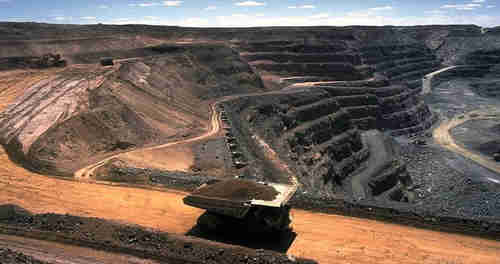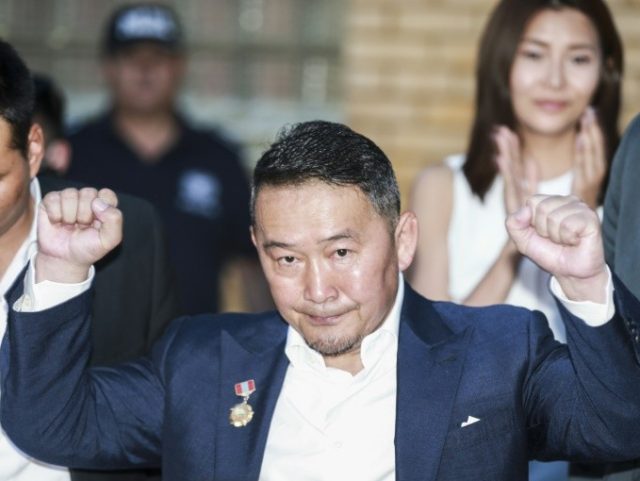This morning’s key headlines from GenerationalDynamics.com
- Mongolia elects new president after highly nationalistic anti-China campaign
- India to help construct Mongolia’s first oil refinery
- Brief generational history of Mongolia
Mongolia elects new president after highly nationalistic anti-China campaign

Mongolia’s Oyu Tolgoi open-pit copper mine in South Gobi desert
Khaltmaa Battulga, a fierce critic of China, won the June 26, 2017, election for president of Mongolia after a highly nationalistic campaign, taking advantage of the deep anti-China xenophobia across the population. At the beginning of the campaign, his slogan was “Mongolia First,” echoing Donald Trump’s “America First” motto. He frequently mentioned “threats” from the east, meaning China.
During the campaign, Battulga even referred to his opponent contemptuously as an erliiz, a person of mixed Mongolian and Chinese heritage, and used the slogan “Mongol Ylna” (a Mongol will triumph) to point out that only he had a Mongol origin. Battulga also advocated greater economic independence from China.
There is a bit of a backstory to Battulga’s campaign for president.
It is worthwhile pausing here to say again that China has always claimed that it never interfered in other countries’ internal affairs. So whenever someone complained that China was jailing, torturing and massacring peaceful protesters or Tibetans or Uighurs, Chinese officials would ignore the complaints, saying it was an internal matter.
China’s policy was phony, of course, and that is illustrated by what happened to Mongolia in 2016. In November, Mongolia invited the Dalai Lama to visit for a four-day trip. The Dalai Lama is revered by Buddhists in Mongolia, but also by Buddhists in China’s Tibet, which is why Chinese officials hate him.
So China punished Mongolia in December 2016 by closing part of the border, leaving hundreds of trucks carrying copper and coal backed up on the highway in sub-zero temperatures. Mongolia was forced to make an official apology.
So now move forward in time to the presidential election campaign in 2017. One can well imagine that this contemptuous treatment by China infuriated the Mongolian electorate, stoking nationalism and xenophobia towards China.
So it appears that China’s policy of punishing Mongolia has backfired and was an important part of the election of China’s nemesis, Battulga. China would have been better off following its fictional policy of non-interference in other countries’ internal affairs. East Asia Forum (11-Aug-2017) and The Diplomat (3-Oct-2017) and Foreign Policy (5-Dec-2016) and The Citizen (India)
India to help construct Mongolia’s first oil refinery
Much to China’s displeasure, India will be invading China’s backyard by helping to build Mongolia’s first oil refinery. India is also providing a $1 billion credit line to finance the projects. The 20-year loan will have an interest rate of 1.75 percent and principal payments will be waived during the first five years. This rate is considerably lower than China is reportedly charging countries for One Belt One Road infrastructure, with the objective of avoiding a disaster similar to the one Sri Lanka suffered when they had to give China control of Sri Lanka’s seaport in lieu of repaying the loan to finance building the seaport.
Mongolia is landlocked, lying between Russia and China, and those countries are its main trading partners. Presently, Mongolia exports crude oil to China, but imports refined petroleum products from Russia. Once the project is completed, The refinery will have a processing capacity of 1.5 million metric tons of oil per year and will annually produce 560,000 tons of gasoline and 670,000 tons of diesel fuel, as well as 107,000 tons of liquefied gas, giving an enormous boost to Mongolia’s economy.
The project will substantially reduce Mongolia’s dependence on China for its energy needs, and bring Mongolia closer to India. Sputnik News (Moscow) and Swarajya Magazine (India) and Tribune (India)
Brief generational history of Mongolia
Mongolia is a land-locked country nestled between Russia and China. Thus, most of its history is dominated by its relationship with those two countries. In the 1200s, the Mongols under Genghis Khan conquered and dominated China in a generational crisis war that climaxed in 1206, forming the Mongol Empire, the largest empire in history. In the next generational crisis war, Genghis Khan’s grandson, Kublai Khan, conquered all of China and created the Yuan Dynasty.
The Yuan Dynasty ruled all of China until it was overthrown by the Chinese Ming Dynasty in 1368. By 1636, all of Mongolia was conquered and ruled by its successor, the Qing Dynasty.
The Qing dynasty fell in 1911 in a generational Awakening era climax, part of which was a proxy war between China and Russia in Mongolia. Mongolia was under a Soviet-dominated Communist regime for almost 70 years, from 1921 to 1990. In 1932, a crisis war began in the form of a Buddhist rebellion against Russia’s communist government.
After declaring independence from China in 1924, the People’s Republic of Mongolia remained embroiled in rivalries between Russia and China, and so maintained its communist identity, giving up its Buddhist identity for secularism. Thus, Javzandamba Hutagt, the 9th Bogd (spiritual leader of Mongolian Buddhists), born in Tibet in 1932, was barred from traveling to Mongolia until the end of Mongolia’s communist era in 1990, as the Soviet Union collapsed. Since then, Mongolia has been increasingly turning from secularism back to its Buddhist roots, and the Dalai Lama has played an active part, much to the consternation of the Chinese. In particular, the Dalai Lama hopes to defeat China’s attempt to name his successor, by declaring that the next Dalai Lama will be born on Mongolian soil.
Mongolia is a resource-rich country, with big deposits of copper, coal, gold, and oil. In 2011, Mongolia economy grew by an astronomical 17.5 percent, thanks to its huge reserves of copper, coal, and gold, making the economy seem invincible. Instead of saving some of that money, Mongolia borrowed billions of dollars to invest in huge road and infrastructure projects. When the price of commodities collapsed, Mongolia’s economy was in serious trouble.
Mongolia is hugely dependent on China, which receives 90 percent of its exports. So Mongolia was hurt even further when China decided to punish Mongolia, after the visit by the Dalai Lama. Mongolian Embassy and University of Central Arkansas and CS Monitor
Related Articles
- China punishes Mongolia for Dalai Lama visit during financial crisis (29-Dec-2016)
- Mongolia in economic crisis asks the IMF for a bailout (05-Oct-2016)
- China’s yuan devaluation causes currency chaos in Asia (20-Aug-2015)
- Mongolia’s natural resource riches lost to corruption and foreigners (08-Aug-2013)
- Japan and Mongolia cooperate to counter China’s influence (19-Apr-2013)
KEYS: Generational Dynamics, Mongolia, Khaltmaa Battulga, China, Dalai Lama, India, Russia, Sri Lanka, Genghis Khan, Mongol Empire, Yuan Dynasty, Ming Dynasty, Qing Dynasty
Permanent web link to this article
Receive daily World View columns by e-mail

COMMENTS
Please let us know if you're having issues with commenting.